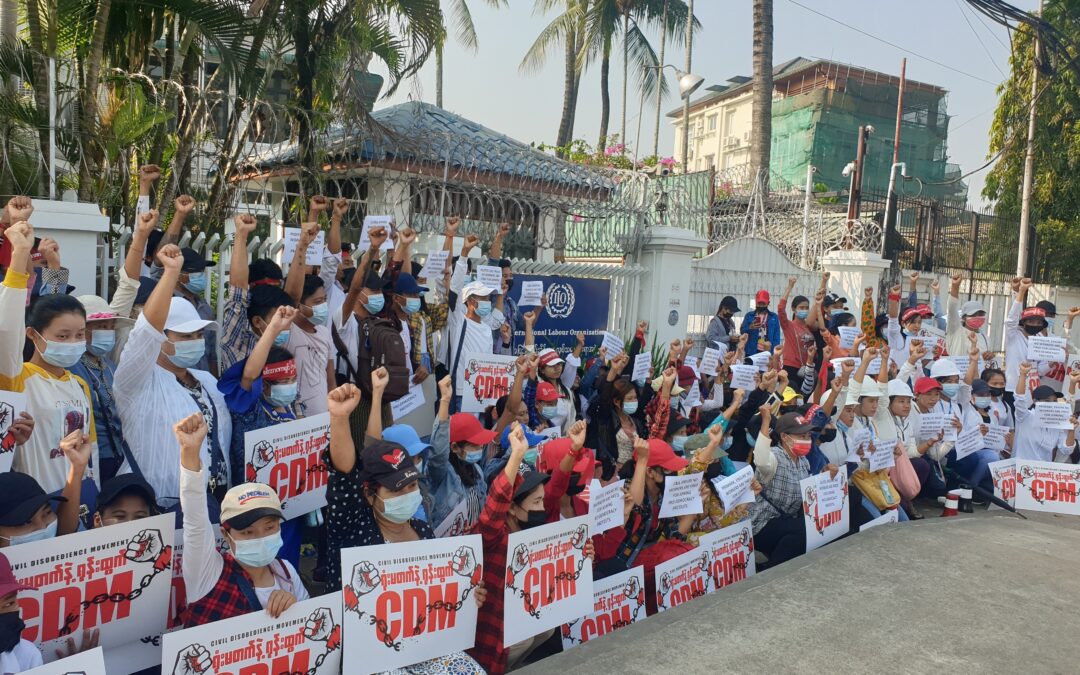
Apr 29, 2021
Two union leaders in Myanmar recently have been arrested for their participation in pro-democracy rallies, and unions worldwide are calling for governments to halt trade and other financial support that provide backing to the country’s military government. The total number of union leaders arrested since the February 1 military coup is at least 20, according to union leaders. (Support workers under attack in Myanmar.)
More than 750 people, including more than dozen union members, have been killed and at least 3,400 people arrested. Union members killed include Chan Myae Kyaw, a union activist and truck driver at a copper mine, who was shot dead while protecting other protestors during a peaceful rally.
Ma Myo Aye, leader of the Solidarity Trade Union Movement (STUM), was arrested at the union’s office in Yangon in recent days and taken to prison by the military. Union leaders say she is charged for allegedly violating Section 505a of the Penal Code, which makes it a crime to cause or intend to cause disobedience or disloyalty to members of the government. Her first court hearing is scheduled for April 29.
She has been transferred to Insein prison in Yangon, which union leaders say is notorious for its torture of prisoners. Myanmar media is reporting horrific sexual assault and other forms of torture against women imprisoned by the military.
Mi Aung, the finance officer of the Hmawbe Brick Factory Union, an affiliate of the Building and Wood Workers Federation of Myanmar (BWFM), was arrested by the army in Hmawbe, where she was visiting her family. Her whereabouts are unknown. The union is vowing to carry on the struggle for democratic freedoms.
The two leaders are among tens of thousands of union members who have taken a leading role in the nationwide Civil Disobedience Movement (CDM) to peacefully protest for an end to the military coup. Union offices have been ransacked and the military has conducted door-to-door searches for union activists, most of whom have now gone into hiding outside Yangon. Arrest warrants have been issued for at least 75 union leaders.
Military Harassing Garment Workers, Union Activists Fired
Garment workers–women in particular–have taken a leading role in the protests, with the country’s 450,000 garment workers especially active in organizing civil disobedience actions and shutting down factories.
In Hlaing Thar Yar, an industrial zone outside Yangon, factories are re-opening despite the dangers to workers. The Industrial Workers’ Federation of Myanmar (IWFM) says the military is arbitrarily stopping workers on the streets, demanding they give their phones to soldiers or face arrest. If they do not have phones, the military requires them to pay a fine. During CDM rallies, the military has killed more than 100 workers in the area, burning some alive, and factories also have been burned, according to the federation.
Yet if workers do not return to their jobs, IWFM says factory management is using their absence to lay off union representatives. Because the military regime cut phone lines and internet access, workers are unable to tell their employers they cannot return to work, and so lose their severance pay.
Unions Worldwide Demand Immediate Action
IWFM and the Federation of General Workers-Myanmar are asking multinational fashion brands to ensure workers can take unpaid leave if they request it because of the lack of safety, and to enable participation in peaceful pro-democracy demonstrations.
Unions around the world are pushing their governments to take immediate action by isolating the military junta and impose sanctions on the Myanmar Oil and Gas Enterprise (MOGE), which provides the military with crucial financing.
The global union movement also is urging international financial institutions to recall all projects and loans to the military government, and initiate dialogue with the National Unity Government, which includes leader Aung San Suu Kyi, who was among elected officials the military arrested.
A coalition of global union federations issued a statement conditionally supporting the Five Point Consensus statement by the Association of Southeast Asian Nations (ASEAN) in which the organization and Myanmar’s junta agreed to a plan to end violence and hold a constructive dialogue among all parties.
While ASEAN’s plan is a good, partial step forward, the union federations say, it omits key concerns.
“A dialogue process will be meaningless if political leaders remain imprisoned and if trade unionists, activists and even health workers who assist the injured, remain at risk of arrest, torture and imprisonment,” the union federations say. “Trade unionists have been arrested, tortured and harassed in door-to-door searches, while others are hiding in fear. The military has imposed widespread restrictions on workers’ rights and curtailed freedoms of speech and assembly, blocked social media and declared 16 labor-related organizations illegal.”
Education International is urging the United Nations Security Council to take stronger action, including targeting military leaders, and asks national governments to use all means available to sanction the military, including through economic pressure.
IndustriALL global union is calling on companies to end commercial ties with the military and urging its affiliates to pressure governments to impose economic sanctions
In New Zealand, the Council of Trade Unions is pushing its government to not ratify the Regional Comprehensive Economic Partnership (RCEP) trade agreement because it includes trade with Myanmar. The Swedish union of forestry, wood and graphical workers called on the country’s Forest Stewardship Council to stop providing certifications to raw materials exported by Myanmar’s military junta.
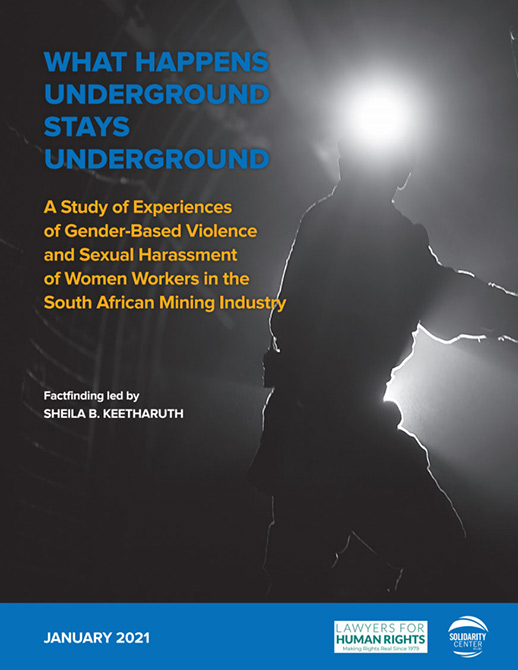
Apr 28, 2021
Women working in South African mines “at times confront danger, violence and indignity in their work environments,” where gender-based violence and harassment (GBVH) appears both widespread and normalized, according to a new report from the Solidarity Center and South Africa-based Lawyers for Human Rights (LHR).
The report, “What Happens Underground Stays Underground: A Study of Experiences of Gender-Based Violence and Sexual Harassment of Women Workers in the South African Mining Industry,” found that while verbal harassment is most common, women mineworkers also face requests for sexual favors in exchange for physical labor or for promotions, transfers or changes in work schedules. And sexual assault and harassment can occur both above and below ground at mines.
GBVH in the mining sector can be attributed to a range of complex political, social and economic factors, including:
- The dark and isolated nature of underground mines makes GBVH more likely, and monitoring and supervision of workers and evidence collection more difficult.
- South Africa’s dominant patriarchal social norms are exacerbating reporting barriers by enabling a culture of silence and victimization and the economic dependency of women on men.
- Women working within the numerically and culturally male-dominated sector are outnumbered and often subordinated in their personal security and professional development.
- Some business strategies are undermining the well-being of women workers in the mining industry, such as the outsourcing of female worker recruitment, which can expose recruits to sexual exploitation by gatekeepers of lucrative jobs, and the failure to accommodate women in the design and placement of facilities such as bathrooms, locker rooms, bus stops and elevators, which leaves women vulnerable to violence and harassment.
The report’s findings and recommendations are based on interviews conducted in Cape Town, Johannesburg, KwaZulu-Natal, Mpumalanga, Rustenburg and Wonderkop last year with former and current women mineworkers and representatives of women’s structures within mining unions, including the National Union of Mineworkers (NUM), the Center for Applied Legal Studies at Wits (CALS), the South African Gender Equality Commission, the South African Human Rights Commission and the Wits Mining Institute. All women mineworker interviewees chose to remain anonymous, to protect their safety and jobs.
“Women mineworkers, striving to support their families, live a troubling reality—one that comes at great cost to their physical and mental well-being. The stakes are high, and the failure to prevent GBVH amounts to granting tacit permission to perpetrators,” according to the report.
Lead report researcher Sheila B. Keetharuth—who previously served on the United Nations team of international experts on the Kasai, Democratic Republic of Congo—says that the lower proportion of female workers in the mining sector in South Africa is, “a recipe for disaster that necessitates easily accessible and trustworthy reporting mechanisms as provided for in the UN Guiding Principles on Business and Human Rights.”
The International Labor Organization two years ago adopted Convention 190, the first global binding treaty to address GBVH in the world of work. The treaty calls on governments, employers and unions to work together to confront the root causes of GBVH, including the multiple and intersecting forms of discrimination, gender stereotypes and unequal gender-based power relationships. South Africa has yet to ratify Convention 190.
“Safe and healthy jobs are among workers’ most fundamental rights,” says Solidarity Center Executive Director Shawna Bader-Blau. “As we observe World Day for Safety and Health at Work today, we must continue to reinforce that a safe workplace is one that is free of gender-based violence and harassment. And through unions, workers can achieve the strong, collective voice needed to improve safety and health on the job.”
Report recommendations include that:
- South Africa immediately ratify ILO C190 on Violence and Harassment at Work
- Occupational health and safety laws and policies, as well as sector-specific laws and policies, obligate employers to prevent and eliminate GBVH
- The country’s Mining Charter extend employer obligations with respect to prevention and elimination of GBVH and require that special measures be adopted for women working in mining
- In consultation with workers and unions, compulsory GBVH risk assessments be established for identifying safety risks.
- Acquisition of a mining license be conditioned on right holders’ commitment to the prevention and elimination of GBVH
- Employers adopt confidential and independent reporting system
- Women working underground be provided with a confidential, anonymous, efficient and easily accessible incident reporting system.
- Workers be informed that victims of sexual assault have the right to press separate criminal or civil charges against their perpetrators.
- Mandatory and effective education and training with respect to laws and policies on GBVH be provided to workers and supervisors, and that policies addressing GBVH be printed in all official languages, displayed conspicuously throughout the mining shafts, and widely and regularly promoted through interactive workshops.
- Policies against GBVH be included in employment contracts and clearly state repercussions for GBVH violations.
- The mining industry provide education and counseling to rehabilitate perpetrators in cases not likely to reach the level of criminal prosecution.
“Although the report shows that GBVH is rooted in complex and deeply entrenched patriarchal social norms, it also presents fairly simple, cost-effective changes to the work environment—such as improved lighting, a buddy system and safer toilet and locker room locations—that will make women mine workers less vulnerable to crimes of opportunity,” says Solidarity Center Rule of Law Department Senior Program Officer Ziona Tanzer.
Beginning in 2014, the Solidarity Center was a core member of a global coalition of worker rights organizations led by women union activists that successfully advocated for Convention 190. We support our partners as they campaign for their governments to ratify ILO Convention 190 and recognize GBVH as a primary barrier to achieving gender equality and a key step for security of all workers’ rights and seek to enhance the voice of women and other marginalized workers in policy making at the local, national, and international levels to reduce the risk of gender-based violence at work—including through their unions.
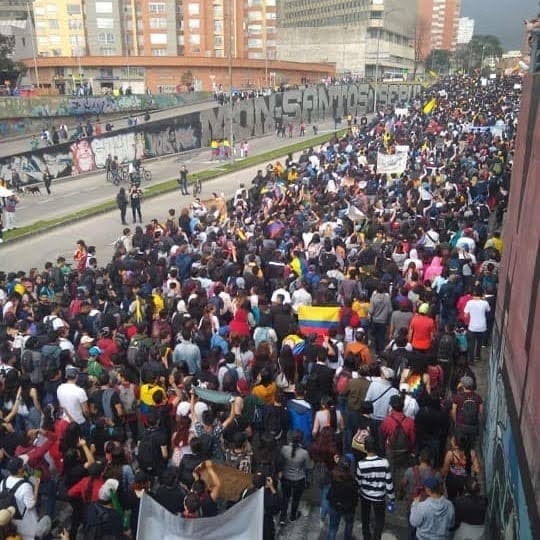
Apr 27, 2021
Workers and their unions in Colombia will hold a national strike April 28 to protest a tax hike proposed by President Iván Duque that would increase costs for workers already struggling from lost jobs and income from the COVID-19 pandemic.
Union leaders say the tax plan is misleadingly labeled a “Sustainable Solidarity Law” and instead would raise taxes on fuel and electricity and greatly expand the number of people required to pay additional taxes. The plan also would increase taxes on produce, harming both farmers and consumers.
It is a “tax reform that disguises itself as solidarity, ” says Unitary Workers Center (CUT) President Francisco Maltés.
Unions across Colombia have joined in solidarity to hold the 24-hour strike as part of a Unified National Command (Comando Nacional Unitario) comprised of the CUT; the General Confederation of Workers (CGT); the Workers Confederation of Colombia (CTC) the Education Workers Federation (FECODE); and the Confederations of Pensioned workers (CPC and CDP).
Tax Big Business, Not Working Families
In an 11-point set of demands, unions say the government should establish tax reform based on progressive taxation so those who earn more pay more. Unions also say taxes should be lowered for small and medium businesses while increased for big business, including multinationals. Further, tax evasion should be effectively punished and taxes increased on large land
Colombian workers have been especially hard-hit during the pandemic. Unemployment is at a record 20 percent, with more than 5 million people losing their jobs.
Women in Colombia, as around the world, have been disproportionately affected. Between September 2019 and September 2020, for every man who lost his job, 2.2 women did so, nationally. In smaller cities, for every eight women who lost their jobs, one man lost his job. Many women work in the informal sector, where nearly half of Colombians make their living as market vendors and domestic workers, who are paid low wages and are not covered job protections like health care.
The pandemic compounded workers’ struggles to make a living and support their families. In 2019, more than 35 percent of Colombians lived in poverty, and the top 10 percent of the country’s earners received 40 percent of the country’s income, 10 times what the bottom 20 percent earned.
Beginning in November 2019, tens of thousands of workers have taken to the streets to protest the Duque government’s repeated attempts to hike prices and reward corporations with tax cuts.
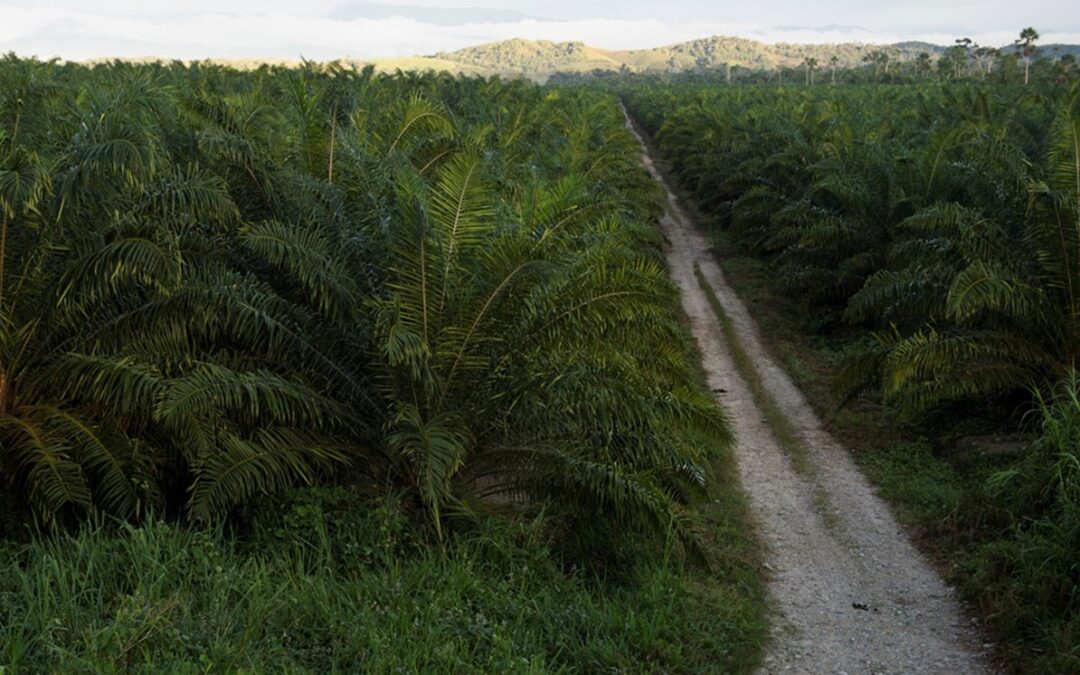
Apr 22, 2021
Marking this year’s April 22 Earth Day, the Solidarity Center is launching a new, partner-informed, inclusive strategic plan to support workers and their unions around the world to address impacts and drive solutions for an accelerating climate crisis.
“The Solidarity Center recognizes that workers and their communities—especially in the global south—are disproportionately impacted by the climate crisis. We are committed to directing resources and attention toward people-centered climate policy and legislative advocacy by our partners and allies in their respective countries,” says Shawna-Bader Blau, Solidarity Center executive director.
The Solidarity Center’s strategic plan—centered on ensuring decent work and a strong labor movement in the future—endorses the following program and advocacy approaches:
- Developing worker-driven climate solutions and playing a significant role in their implementation to protect hard-fought gains and advance worker rights in changing industries
- Using collective bargaining to advance cleaner, safer and more sustainable operations across sectors; and ensuring an inclusive process that prioritizes the needs of workers and their communities in transitioning sectors
- Building broader coalitions, securing the mutual commitment of climate, human rights and community organizations in the fight to win decent, unionized green jobs; building healthy, resilient and sustainable communities; and supporting worker rights
- Effectively participating in national, regional and global climate justice negotiationsand holding policymakers and employers accountable for achieving a just transition to a cleaner economy that enables workers to enjoy their fundamental freedoms and rights; and
- Advancing an enabling legal environmentto achieve a just transition, recognizing the critical link between labor rights and environmental justice.
“On Earth Day, the Solidarity Center stands with our partners as they drive the vision for a fair or just transition to a cleaner, more inclusive, and more equitable economy,” says Sonia Mistry, Solidarity Center global lead on climate change and just transition.
Read more here.

Apr 21, 2021
When the Nigerian government sought to raise taxes on basic goods and decrease subsidies on key items like fuel as millions of workers struggled without jobs or wages during the COVID-19 pandemic, the 4 million members of the Nigerian Labor Congress (NLC) successfully stood up against these assaults. NLC President Ayuba Wabba says the union first tried negotiating with the government. When that effort did not work, workers were set to strike, he said on the latest episode of The Solidarity Center Podcast.
“Many Nigerians are in very difficult situations right now because of the challenge of COVID-19. Most of their income have been disrupted and their survival is so difficult. So that is why we have to respond, to actually draw the attention of government. And such an approach is very, very necessary. We thought that governance should be about the interest of justice,” Wabba told podcast host and Solidarity Center Executive Director Shawna Bader-Blau.
A New Social Contract
In a wide-ranging conversation, Wabba, who is president of the International Trade Union Confederation (ITUC), describes efforts at the global level to build a post-COVID world where all workers are covered by social protections such as paid sick leave, access to protective safety equipment, health care and good wages.
“COVID-19 has exposed the inadequacies in the entire social protection system,” he says. “We are also trying to make sure that COVID-19 is one of the diseases that is also covered by occupational health and safety for all workers, including casual workers, including migrant workers, including workers working in the precarious sector because this is very important. If not, the inequality gap between the rich and the poor will continue to be widened.”
As a global union leader, Wabba is at the forefront of the international campaign to ensure the future of work ensures good jobs as well as green jobs to address the ongoing challenges of climate change. “You don’t need to contaminate the environment for you to be able to retain jobs. Jobs can be produced using greener forms of energy.”
Download Season One Episodes
The Solidarity Center Podcast, “Billions of Us, One Just Future,” highlights conversations with workers (and other smart people) worldwide shaping the workplace for the better.
Check out the full first season of The Solidarity Center Podcast and stay tuned for season two this fall!
This podcast was made possible by the generous support of the American people through the U.S. Agency for International Development (USAID) under Cooperative Agreement No.AID-OAA-L-16-00001 and the opinions expressed herein are those of the participant(s) and do not necessarily reflect the views of USAID/USG.
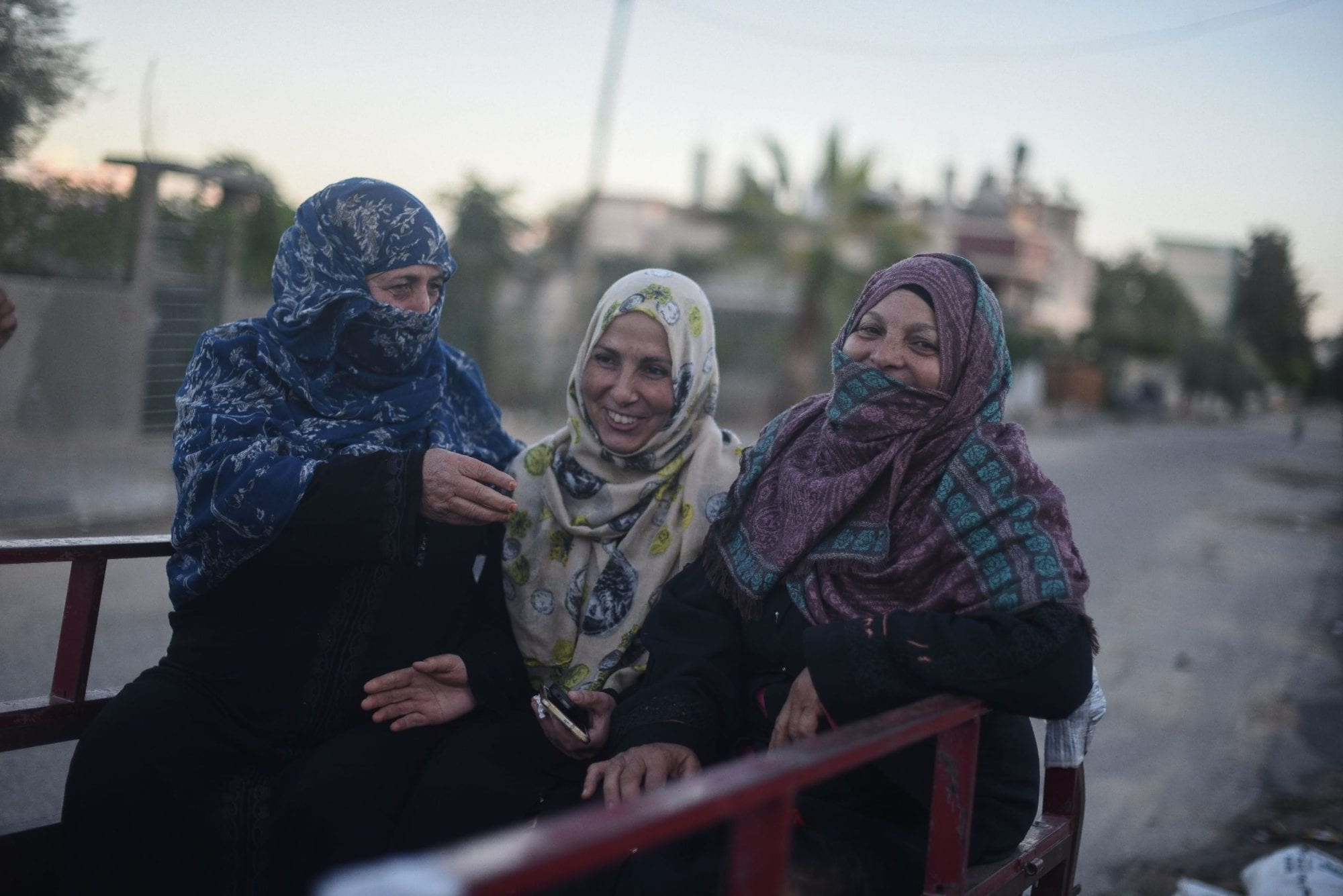
Apr 20, 2021
Workers in Palestine now have even more support for their efforts to achieve rights and respect at work: The National Alliance for Social Justice in Palestine, launched in Ramallah in recent days, seeks to craft Palestinian labor law in line with international labor standards and expand equitable legislation for all Palestinians. Alliance leaders say such coordination is especially essential to advance social justice standards and worker protection during COVID-19 lockdowns.
The 41-member alliance, headed by the Palestinian General Federation of Trade Unions (PGFTU), includes the majority of professional unions, trade unions and Palestinian civil society institutions in the West Bank and Gaza. PGFTU spearheaded the coalition with support of the International Labor Organization (ILO) in March 2021.
Among the Code of Honor Principles:
- Adopting the principles and standards of sustainable and alternative development to build a national economy and reject all forms of normalization
- Adopting a participatory, holistic approach in implementing the Alliance’s plan and programs
- Promoting and adopting mechanisms to advocate and campaign for policies and regulations on economic and social rights and amendments to the labor law in line with international labor standards
- Believing in the coalition that will build labor law, policies and social protection systems
- Believing in the necessity of unifying demands on issues of social justice, economic and social rights, and trade union demands for all member institutions of the coalition
Among the Alliance Founding Partners:
- PGFTU (president)
- General Union of Palestinian Workers
- The General Federation of Independent Trade Unions
- The General Union of Palestinian Women in West bank and Gaza Strip
- Sharek Youth Forum
- Wasel Foundation for Youth Development
- Women and Media Development Association – TAM
- Center of Psychosocial Counselling for Women
- The Palestinian Foundation for Empowerment and Local Development – Reform
- Center for Feminist Studies
- Palestinian Broadcasting Union
- Palestinian NGOs Network
- Union of Palestinian University Professors and Employees
Solidarity Center programs in Palestine support the PGFTU in building coalitions with civil society organizations to combine efforts with the labor movement to advocate for national policy reform, campaign for labor rights and address the important issues for workers collectively.






